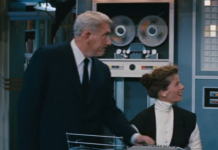 Piracy has been a constant in all media industries for the last few years, with trade organizations complaining that it’s been cutting into their revenue. Yet for the last few years until 2011, despite all the MPAA’s furor over piracy, the movie industry has been having record sales with each year being better than the last.
Piracy has been a constant in all media industries for the last few years, with trade organizations complaining that it’s been cutting into their revenue. Yet for the last few years until 2011, despite all the MPAA’s furor over piracy, the movie industry has been having record sales with each year being better than the last.
Oddly enough, now that movie revenues have dropped a bit for 2011, analysts are not blaming piracy. A Chicago Tribune article sourced from CNN begins:
The curtain is falling on the worst year for Hollywood in recent memory.
The movie industry sold 1.28 billion tickets in North America in 2011, according to Hollywood.com, the lowest since 1995. That was good for $10.2 billion in box office revenue, down 3.5 percent from last year.
and goes on to credit it to “a weak economy and expanding home entertainment options” without ever once mentioning piracy.
(Wait a minute…revenues that still exceeded $10 billion dollars and were only down by 3.5% amount to ”the worst year in recent memory”? Say what?)
Movie critic Roger Ebert has his own analysis of why the revenue is off. His reasons include the lack of any real “must-see” blockbuster this year, costly ticket and concession prices, lackluster moviegoing experiences with annoying talkers and cell-phone users, competition from living-room delivery options, and lack of choice in available movies.
The message I get is that Americans love the movies as much as ever. It’s the theaters that are losing their charm. Proof: theaters thrive that police their audiences, show a variety of titles and emphasize value-added features. The rest of the industry can’t depend forever on blockbusters to bail it out.
Interestingly enough, the specter of higher price without necessarily higher value is also plaguing e-books. But unlike with movie theaters, all the people who write books that the big chains won’t take are able to get them directly to consumers via Amazon. While this is theoretically possible with movies and other recorded works (for example, via Youtube), and some folks like Louis C.K. are having success getting their works out that way, the high bandwidth costs of video delivery make that less of an option for most unless they can cut some kind of deal with Netflix or some other distributor.
E-books also face competition for attention by other forms of media, including free works on the Internet. and there have been a number of complaints about lackluster e-reading experiences as publishers are notoriously lax about proofreading and fixing typos. Hmm, perhaps Ebert’s analysis is even more universal than I’d thought.

































My wife and I, along with friends, used to go the local theater as often as 3 times a month. It was a rare month when we didn’t go at all. But then the local theater (a Regal Entertainment multiplex) stopped advertising in the local newspaper. As a result, in 2011 we saw 4 movies the entire year at the theater. I told the local manager that for many of us, the ad acted as a reminder and made it easy for us to plan with friends to go to the movies. The manager said we could still get the schedule online. I tried it once — too complex and not worth my time and effort.
I told the manager that and he suggested we go to their Facebook page. I told him that none of us are on Facebook, and have no interest in Facebook. He simply shrugged his shoulders, aying it was Regal policy now.
I think part of the decline is that a fair number of the moviegoers were seniors like me and the theaters have simply decided we are not a demographic worth cultivating. The idea that if it is online it is available doesn’t always wash. We’ve just decided to spend our money elsewhere and make the effort to see only a rare movie.
Ebert is talking about the theatre industry; why the theatres aren’t making more money from movies; his comments tangentially involve the movies themselves, but he puts far more emphasis on the delivery experience. You can’t equate that directly to ebooks, though you could compare the theatres to the Amazons and Barnes & Nobles out there, delivering ebooks.
There are a number of solid parallels between theatres and ebook sellers, including their issues and their attempts to solve them. For example, Ebert mentions theatres’ lack of choice (limit to a few mega-popular movies and missing many smaller options, like art movies) affecting them, while we all know how the bestseller lists dominate sales and exclude so many good books. And I found it interesting how threatres feel they must protect the over-30 moviegoers from children with their cellphones… I see an obvious parallel to ebook sellers protecting their customers from “pirates,” usually considered the younger of the consumers.
The parallels break down where theatres rail against their competitors, like Netflix taking the theatre experience to the home: There is no “netflix” of ebooks, and at any rate, other sellers are competing for the same final outlet, the ebook reading device. If anything, the theatre itself might parallel the mass-market ebook reader, the Kindles, Nooks, etc, where the “home experience” might parallel the smartphone, the iPad, the tablet, the personal reader of choice; and in that area, the mass market devices seem to have the market wrapped up.